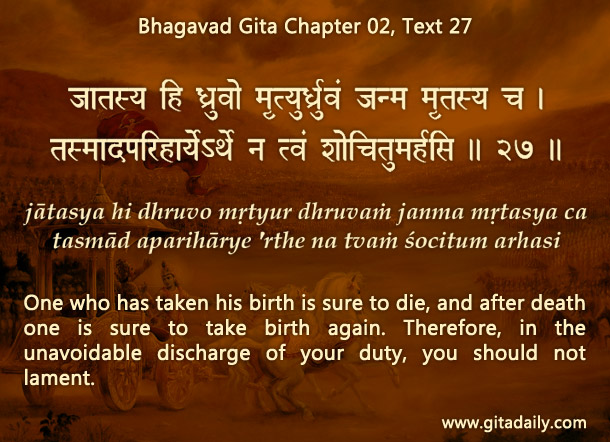Some people say, “The Gita teaches that because the soul is eternal and the body is perishable, there’s nothing wrong for Arjuna to kill in the war.”
This is a massive misunderstanding of the Gita’s message — possibly a well-intended simplification that ends up becoming a distortion.
In the section on the soul (02.11-30), Krishna himself indicates why he is talking about the soul and its eternality: to stop Arjuna’s lamentation about the inevitability of death. He mentions this both at the beginning (02.11) and several times at the end (02.25, 02.26, 02.30). If Krishna’s purpose had been to justify killing in the war, he could have finished the Gita at this point.
Instead, he then uses the knowledge of the soul’s eternality as a foundation to deliberate the Gita’s driving question: what is the right thing to do? (02.07) Subsequently, he analyzes paths such as karma-kanda (02.31-37: pious action to gain fame in this world and heaven in the next world); karma-yoga (02.38-53: detached dutiful action to gain wisdom in this life and liberation in the next life) and so forth.
Overall, the knowledge of the soul’s eternality provides a long-term framework for finding meaning and purpose within one’s duty, which in Arjuna’s case happens to be fighting. Krishna’s purpose in providing spiritual wisdom is not to foster hard-heartedness about death, but to facilitate clear-headedness about the choices for leading the most worthwhile life, given the inevitability of death. His purpose is never to license indiscriminate violence, but to cultivate the forbearance necessary to not let the fear of violence stop one from making necessary hard choices.
One-sentence summary:
The Gita teaches the eternality of the soul not to devalue the killing of life, but to re-evaluate what makes life worth living as a basis for making difficult but essential choices.
Think it over:
- What is Krishna’s stated purpose in speaking about the eternality of the soul?
- How is this purpose seen in the Gita’s subsequent sections?
- How does knowledge of the soul’s eternality modify our approach to life?
***
02.27: One who has taken his birth is sure to die, and after death one is sure to take birth again. Therefore, in the unavoidable discharge of your duty, you should not lament.
To know more about this verse, please click on the image


Leave A Comment